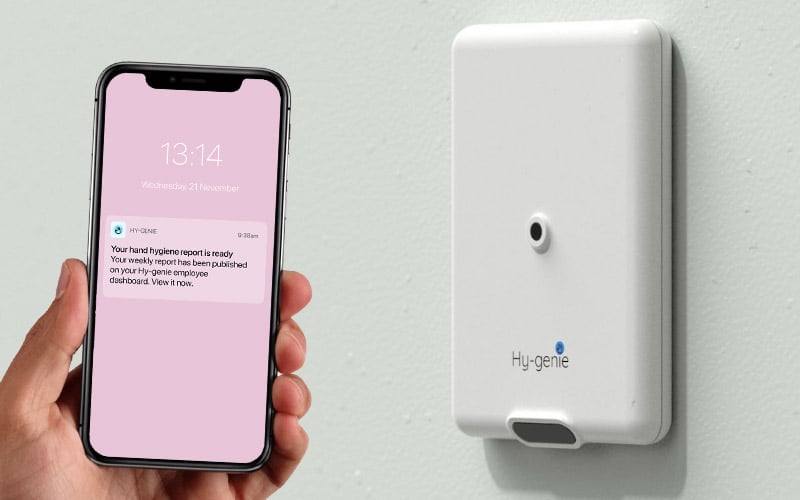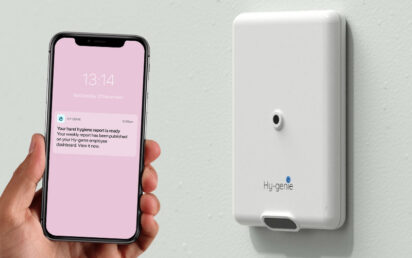An IoT-powered hand sanitiser dispenser is to be rolled out at Alder Hey Children’s Hospital following a trial.
The technology was created by Richard Cooke, former director of infection prevention and control at Alder Hey, who came out of retirement in 2017 to found start-up Hy-genie.
The product tracks and records usage of sanitation stations across hospitals to prevent the spread of healthcare-associated infections, a subject close to Cooke’s heart.
In an interview with BusinessCloud last year, Cooke said he is seeking to revolutionise hand hygiene compliance across the healthcare system and that he planned to put in place a CEO to run the business full-time.
Gavin Delaney, who brings a background in early-stage businesses and tech transfer into the NHS from the private sector, took that role at the start of the year. Meanwhile Cooke is back working in the pathology lab at Liverpool’s Alder Hey, which is a shareholder in Hy-genie. He is also volunteering at the Nightingale in Manchester.
The firm is now moving a ‘lite’ version of the hand-washing tracker from testing to live in the coming weeks. Delaney says the unprecedented coronavirus situation presents an “uncomfortable” opportunity to showcase the product’s worth
He told BusinessCloud the move to introduce the smart dispensers is a natural extension of the partnership with Alder Hey.
“You almost feel a little bit uncomfortable in being able to benefit as a business out of COVID. People are losing their jobs and the economic outlook doesn’t look great,” he told BusinessCloud.
“We think it will do a great deal of good. [The hospital] has seen this as a great opportunity, not to move the business forward – because that’s not the focus – but how to address some of the issues coming out of COVID.”
The firm’s full product, Hy-genie, contains three combined technologies: a wall-mounted gel dispensing system which counts the number of uses, accompanying badges for health workers which identify who has used the dispenser and a ‘hub’ which collects and collates all that data.
The ‘lite’ version – to be rolled out shortly – will include just the first and last of these technologies. Delaney says amid the enormous pressure of the pandemic, ‘anonymous’ collection of hand-washing data is sufficient.
“What we wanted to do was get something in that gave visibility, credibility and comfort,” he said.
Cooke has maintained that individual staff will not face repercussions if a hospital uses the full product. The goal with either version is to use data to prevent the spread of infections.
Delaney says information on hand sanitisation performance can then be displayed publicly alongside other key stats on wall-mounted TVs around the hospital, providing reassurance.
The potential concerns previously addressed by Cooke – that the technology could feel like ‘Big Brother’ – are similarly dismissed by Delaney, who said there already exists a great deal of tracking technology in a hospital.
“Every time you touch a pass on a door opener, or you go into radiography, or you get drugs out, you’ve been tracked anyway. So it’s about making sure that it’s a positive experience, and as little hassle as possible,” he explained.
“Where you have a busy workforce such as hospitals, one of things they don’t particularly like is people coming, measuring them and telling them that they are wrong. They get a lot of timewasters – and it distracts from their core task.”
Delaney said that once lockdown is lifted, it is unlikely that behaviour will return to how it was before the pandemic. The broad understanding of the importance of washing hands, he said, would help in its adoption before introducing tracking of individuals with that final piece of technology.
“As a stepping-stone to larger acceptance across the board, it’s a very good start,” he said of future plans for implementation.
“Once people see that Hy-genie is installed, it’s not a massive step to start using badges. You can roll that out incrementally, and get a big penetration with the base system.”
Delaney said that Cooke’s idea for the technology, which began long before it was an urgent addition to fighting a pandemic, has been completely validated.
“Hand-washing and hand-associated infections within hospitals is almost like a Holy Grail. Lots of people are trying lots of ways to address this issue. The thought and detail that has gone into looking into how it might work has been really impressive.
“[Richard] is absolutely passionate about this. It’s going strength-to-strength on the academic side. It’s a complete validation of why he went back in.”
Hy-genie is one of many start-ups based at Nova in Liverpool, an organisation which helps fledgling entrepreneurs build their tech ideas into businesses via investment and practical support.


